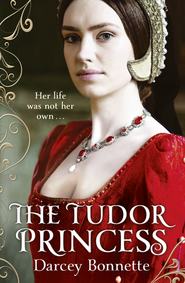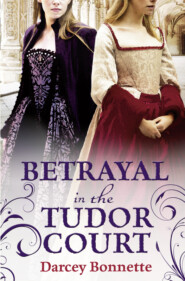По всем вопросам обращайтесь на: info@litportal.ru
(©) 2003-2025.
✖
The King’s Mistress
Настройки чтения
Размер шрифта
Высота строк
Поля
That year two people are banished from court. The first is my mother, a figure I saw so rarely she may as well have not been there to begin with. Her crime was offending Anne by playing go-between for Queen Catherine and her ambassador, Eustace Chapuys, hiding messages in baskets of oranges. The king, displeased that Mother caused such a ruckus, sends her home to Kenninghall.
She does not say good-bye to me. Though I did not see but glimpses of her at most, the thought of being left completely alone, with none but my father as the guiding force in my life, is a daunting one. And Mother’s crime … could it really have deserved expulsion from the life she so loved? Now what would become of her? She is as devoted to Queen Catherine as I am to Anne. To be deprived of the one person she believes in more than anything would be the worst kind of punishment—and Mother knows enough of that simply by being wed to Norfolk.
I find to my surprise that I will miss her. Or, at least, the idea of her.
The second person to be banished is Queen Catherine herself. In July she is exiled to the North. The Anne faction celebrates and the palace is aswarm with youth and vigor.
“No more do we have to see her haunting the halls with her rosary and hair shirt!” Anne says in triumph. We are assembled in Norfolk’s privy chamber. Gathered about are Mary Carey, George Boleyn, and their parents, my uncle Thomas, and aunt Elizabeth.
“We are so close!” Anne cries out. “Almost five years I’ve been waiting …”
“Do you listen, Anne?” Norfolk hisses from across the table. “The pope has granted nothing—we are but a tiny step toward getting what we want. Dowager Princess Catherine has a great deal of support in the North; she could still win. As far as the king is concerned—”He folds his hands and cocks his head, eyeing Anne as carefully as he eyes me during my nightly reports. I am grateful that I am not the only one to be examined so critically. “He could have an attack of his infamous ‘conscience’ and take her back in less than a fortnight. Which means it is vital that you stay the course.” He tilts a brow.
Anne scowls at him and folds her arms across her chest. “You think you know what’s best—”
In a movement so swift it is almost over before it begins Norfolk is on his feet, slamming his fist on the table with a resounding thump. “I don’t think. I know. And if you know what’s good for you, you will listen.” His voice is never raised, not even a note. Perhaps it would be less frightening if it were not so controlled. It would make him more real.
He sits back down and eyes Mary Carey. “You’re still instructing her on how best to keep him … intrigued?”
A smile plays on George’s mouth. Apparently he has been privy to these discussions and perhaps shared some knowledge of his own.
“Yes, of course,” says the much more agreeable Mary. A slight flush colors her cheeks and Norfolk waves a hand.
“Don’t play the modest spring maiden to me,” he says. “We all know well what you are.”
Mary Carey bows her head. I want to reach out to her but do not dare. I remain silent, taking everything in with a racing heart. I am ashamed of my fear and bow my own head.
“Never forget the people’s reaction to you, Anne,” Norfolk continues. “‘We want no Nan Bullen.’ ” He lets the words of the rioting peasants fill her ears. She covers them and squeezes her eyes shut.
“We were on the barge,” she whispers, reliving her ordeal. “The poxy fishwives called it out from shore …” She shakes her head as though trying to banish the disturbing images. “And they mobbed me.” Tears gather at the corners of her black eyes. She blinks. George wraps a protective arm about her shoulders, drawing her close. The movement creates a pang of longing for my own brother.
“You have to try to endear yourself to them, Anne,” Norfolk says. “You have to make them love you and long for you as their queen. The king may weaken under the rejection of his subjects— he may decide you’re not worth all this bother with the pope and Catherine of Aragon’s supporters. Supporters like Charles of Spain.”
“He wants an heir,” Anne says, her voice taut with determination. “I can give him what he most desires. No one will deter him.”
“Everyone can deter him,” Norfolk argues. “Who do you think you are? You’re the lady of the moment. Even should this succeed you will only be useful to him till he gets his heir. And then? Then it is a mistress.”
“Not with me,” Anne says with a proud but joyless smile. “He’d never dare.”
“Oh, wouldn’t he? He dared with Catherine,” says the duke.
“He didn’t love Catherine.”
“He loved her dearly.” My father’s voice bears an edge of danger in it, and I find my fingernails are digging into my palms, sharp as a cat’s claws.
“Anne, you are always dispensable, remember that. If you don’t believe it, take a look at your own sister.” He indicates poor Mary Carey with a careless nod.
Anne draws in a breath. “It doesn’t matter,” she says with a shrug of one shoulder. I know it is a false sentiment. Anne is all about Anne; even I can perceive that. She will not take kindly to rivals. “I will be queen, won’t I?”
“If you play this right,” Norfolk says. “Which means you listen to me. Do you understand, girl?”
Anne draws her expression into one of serene dignity, offering him the slightest of nods. I call this her “queen’s face.” I practice this one when I’m alone, along with her smiles and looks of surprise and coquettish anger. To me she is the quintessence of charm and cultivation.
We are dismissed and prepare to go to supper, but Anne remains a moment, standing in front of my father with her small shoulders squared, a hint of a smile on her face.
“You are an old son of a bitch, Thomas Howard,” she says.
I am awed by the words. I expect my father to strike her for her insolence but instead, after the briefest of pauses, he says with a small smile of his own, “As are you, Anne.” He pats her elbow as he guides her from the room. “Take it as a compliment.”
Anne’s laughter peals forth as she quits the room.
I don’t know why, but I am jealous. Certainly not at the exchange of insults. Perhaps it is of the familiarity, the fact that they can vex each other and still retain some strange favor with one another. Of course Anne is very useful to my father …
I sigh, chastising myself for these uncharitable thoughts as I, too, quit the room, trying to chase away the feeling that I really am not useful at all.
I have mixed feelings. I begin to suspect that I am not on the right side. I think of the queen not as the princess dowager, as we are told to refer to Catherine of Aragon now, but as the queen— the sad, gentle queen who greeted me at Westminster when I first arrived. Now she is alone in her northern castle, suffering as it seems her fate to do. She is denied almost everything and retains the smallest of courts; a handful of loyal maids whose devotion I applaud. She is further punished for her stubbornness by being kept separated from her daughter, who is also in exile until she agrees to sign a document acknowledging the invalidity of her mother and father’s marriage and thus naming herself a bastard.
I am expected to make merry at the expense of such misery. I am not to express even the smallest amount of sympathy for the dethroned monarch or her poor rejected daughter. I am to celebrate the victory of the Howards.
Our victory seems so precarious. What is viewed as triumph one day can be looked upon as tragedy the next; everyone’s fate depends on the fluctuating moods of the increasingly cantankerous king.
“And what would you do if you were Queen Catherine?” asks Madge Shelton one night as we draw the covers over us. My dog, Fitz, sleeps between us; he is spoiled and content, innocent of treachery or plotting.
I do not answer right away. The queen has no friends here, and it would do me no good to offer sympathy of any kind. I measure my words with care. “I would grant the king his divorce; say what needs to be said even if it isn’t true, just to have peace.”
“Do you think it’s true? Do you think Catherine and Prince Arthur consummated their marriage?” she asks with a wicked gleam in her eye.
I shrug and turn my back to her. “Only she knows. I think it’s silly, really. Jesus says if your spouse dies you are free to marry again, which means it was divinely permissible for her to marry King Henry—”
“The Church goes by the Old Testament, clinging to the claim that a man cannot marry his brother’s widow,” Madge reminds me.
“They should go by what Jesus says, not some nameless scribe from Leviticus.” I am surprised at my passion regarding the matter. But I feel the queen has been wronged, so terribly wronged … I must watch my words.
“Don’t say that too loud,” Madge says in a conspiratorial whisper. “They’ll put you in the Tower for being too sympathetic to the qu—I mean, the princess dowager.”
I shiver and she rubs my shoulder.
“Don’t worry, Mary.” She laughs. “You’re Norfolk’s girl; your interests are attuned to Anne. No one could accuse you of papist sympathies.” She pauses, then returns to the original topic. “I’d love to know if it were true, though—about the consummation, I mean. Wouldn’t you?”
“Not really,” I say, not only because it seems a sacrilege to think such about the noble Queen Catherine, but because I already know the answer. No one who behaved with as much conviction as Queen Catherine could be clinging to a lie. She is the most pious, devout woman I know, as well as the most honorable, which means it is exactly as she insists. The marriage to Arthur was not consummated; her marriage to the king is valid.
I sigh. “It doesn’t matter if it is or isn’t,” I say. “Because the king will get what he wants in the end.”
“He always does,” Madge agrees with a yawn as she drifts off to sleep, leaving me to ponder these great things in a mind that, to me, feels very small.
I have become interested in writing verse. Though I do not find myself to be of any unique talent, I am compelled to scribble my little observations and feelings to give them vent. There is a solace in it, an escape. Even bliss, when the words flow right and inspiration surges through my limbs like the aftereffects of mulled wine. I even set some to music, as I am quite accomplished on the virginals and lute, but I dare not say a word about it. I can’t imagine anyone wanting to hear me sing, anyway.
The only person I cannot wait to discuss my newfound passion with is my brother Surrey, who once told me I had a “poet’s heart.” Like him. I would be glad to be like Surrey.








